Dr. Judith A. Miller and first-year student Natalia Thomas were recently interviewed on the Georgia Public Broadcasting show On Second Thought about Miller’s first-year seminar “Fake News.” Speaking to host Virginia Prescott, Miller describes how, as a historian of 18th and 19th century France, she ended up teaching a course with a substantial focus on contemporary U.S. history. Thomas, a first-year student in the course, describes the impact “Fake News” has already had on students: “‘I used to just take what I read at face value,” she explained. “I’ve learned to be more cautious about what I’m consuming, and make sure to check multiple news sources and see what they’re saying about certain issues.”‘ Read the article summary of the conversation and listen to the full interview: “Emory University’s ‘Fake News’ Course Helps Students Tease Fact From Fiction.”
Category / Faculty
Emory History Faculty, Graduate Students, and Alumni at #AHA2020
Faculty, students, and alumni from the Emory History Department were well represented at this year’s American Historical Association meeting in New York City. Scroll through the images below for a glimpse at some of the Emory historians at the AHA.

Dr. Thomas Rogers (2nd from right) opened the late-breaking session “Land Use and Climate Change—Historical Perspectives from Seven Continents”
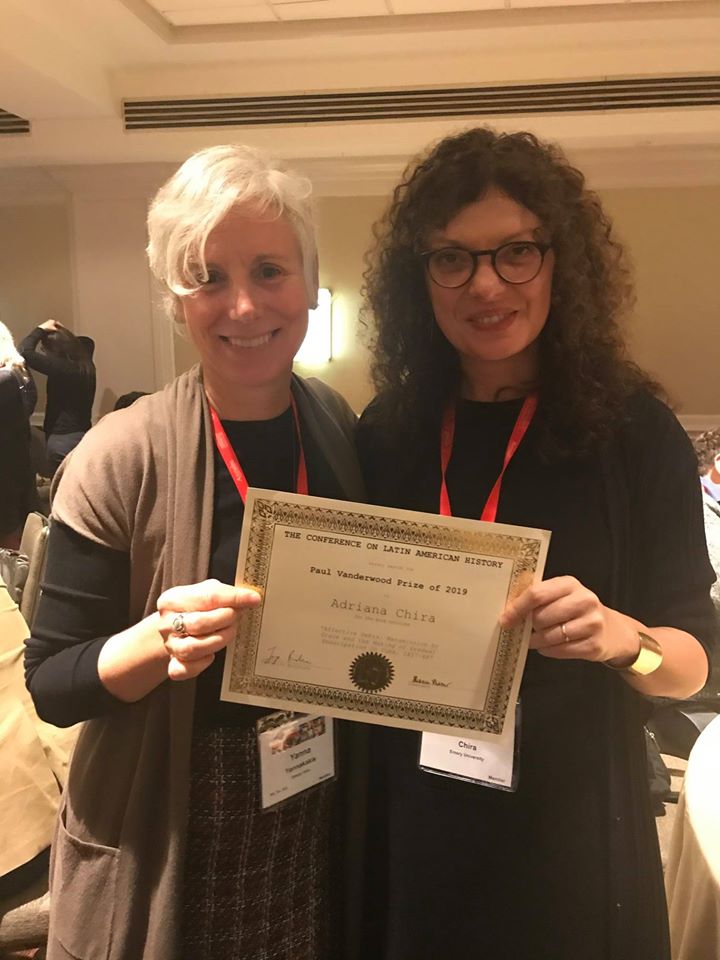
Prof. Adriana Chira (right) was honored with the Paul Vanderwood Prize of 2019, awarded by the Conference of Latin American History for the best English-language article on Latin American history published in a journal other than the Hispanic American Historical Review and the Americas. Prof. Chira is pictured here with Prof. Yanna Yannakakis.
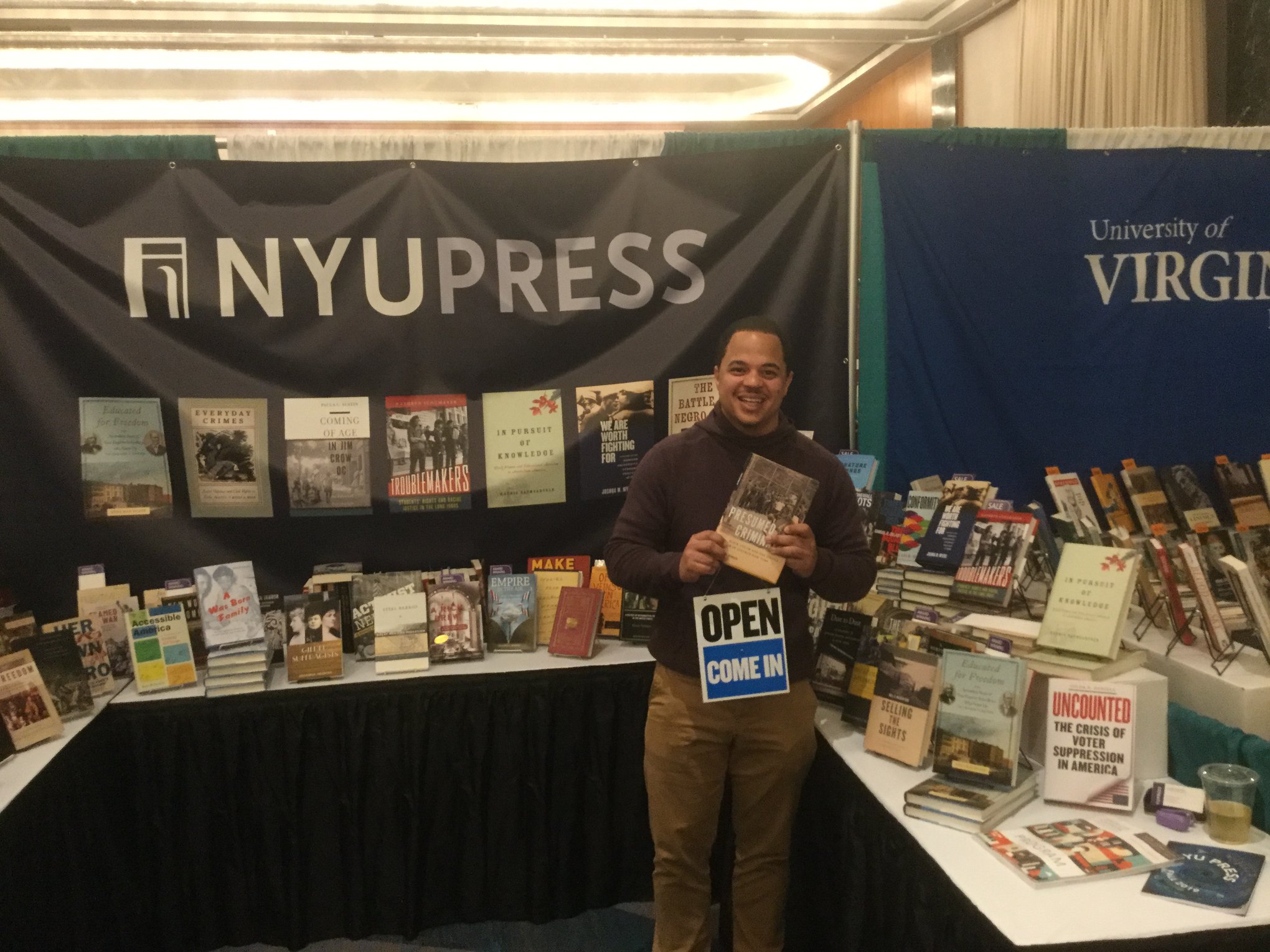
Prof. Carl Suddler visiting his book ‘Presumed Criminal’ at the NYU Press booth.
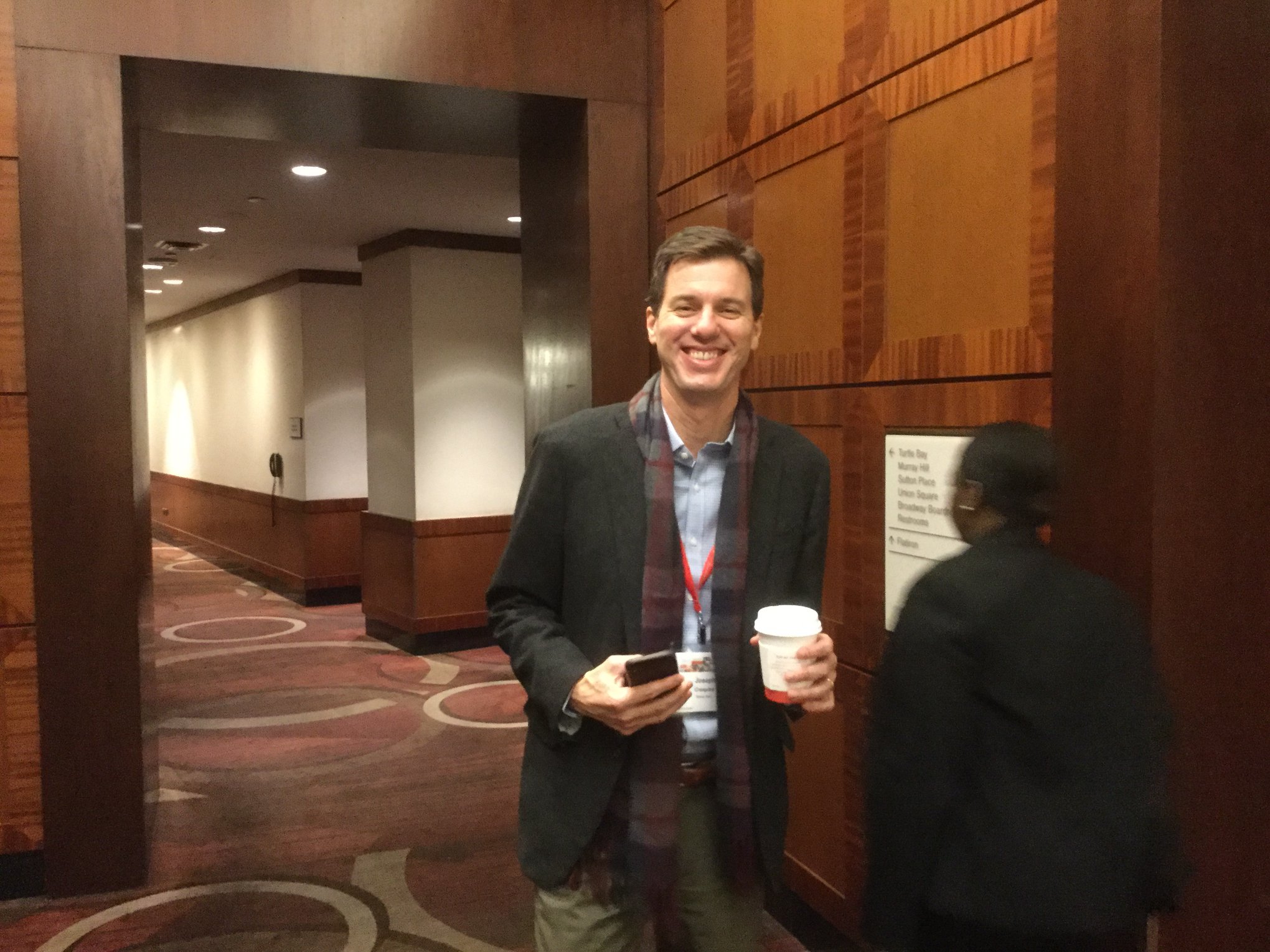
Dr. Joe Crespino on his way to a Saturday morning panel.
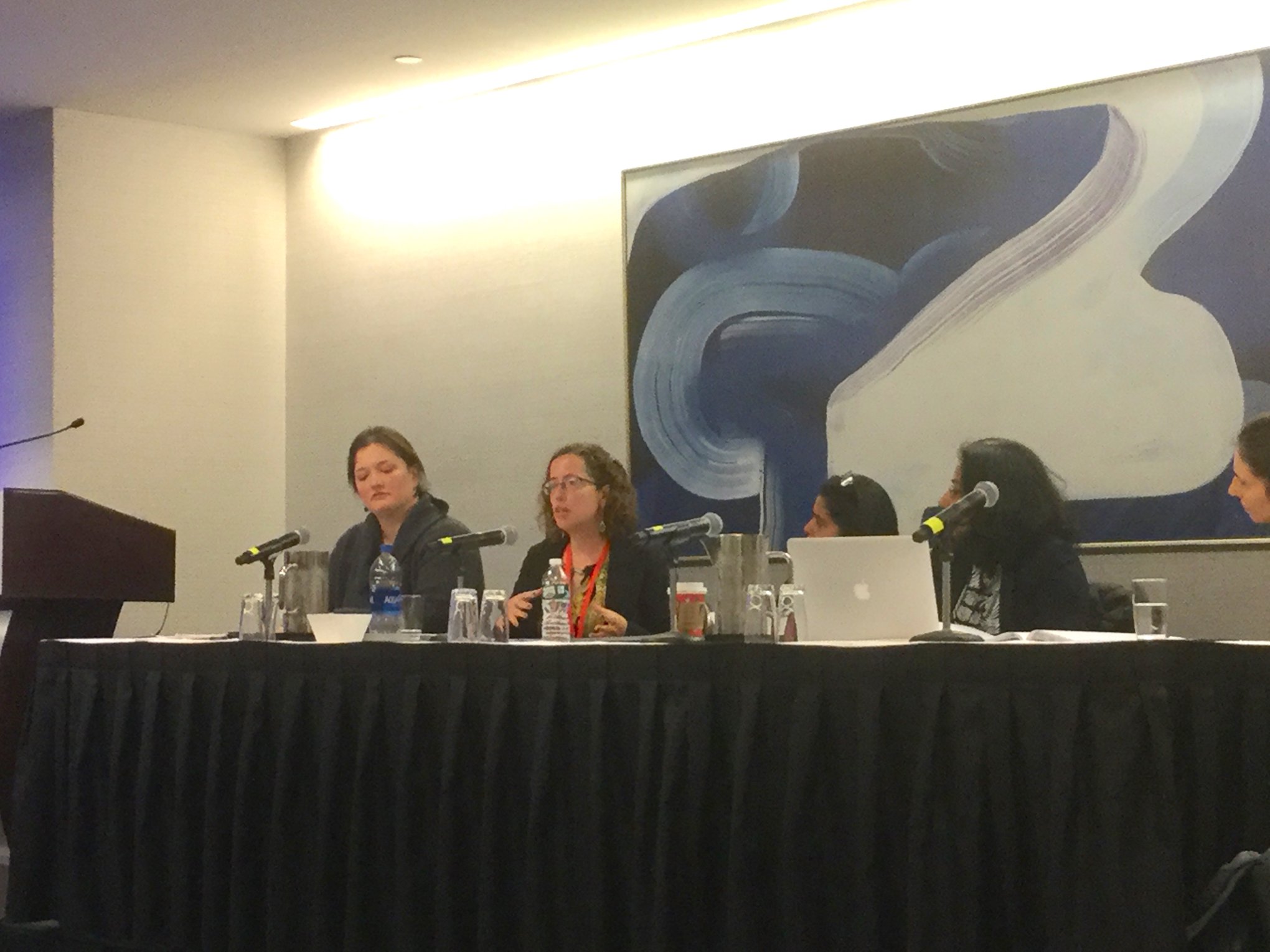
Emma C. Meyer and Rebekah Ramsay were part of the panel “Forging Citizenship after Empire: Reflections from Asia and the Middle East in the 20th Century”
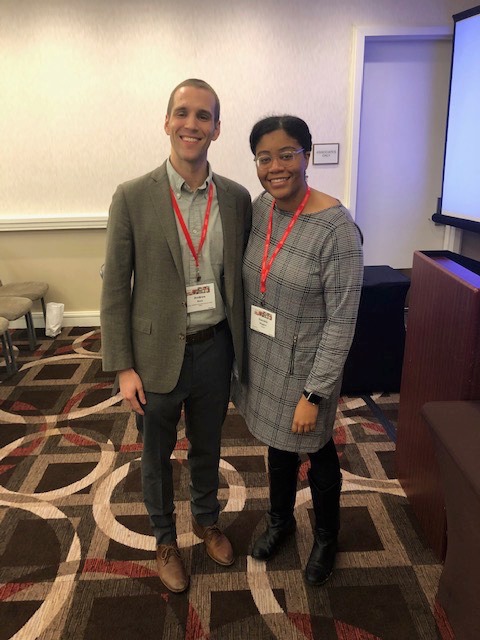
Andrew G. Britt (PhD 2018, now at University of North Carolina School of the Arts) and Danielle L. Wiggins (PhD 2018, now at Caltech) presented on the panel “Planning, Difference, and Dislocation in the Black Americas: Atlanta, Port-au-Prince, and Sao Paulo”

Julia Lopez Fuentes presented her paper “Conflict and Fragmentation within the Europeanist Opposition to the Franco Regime, 1962-68” as part of the panel “Tolerating Totalitarianism: Why did the Franco Dictatorship survive?”
Rogers and Collaborator Manuel Publish Opinion Piece in ‘The Hill’ on Ethanol Policy in the U.S. and Brazil
Associate Professor Thomas D. Rogers recently co-authored an opinion piece in The Hill with collaborator Jeffrey T. Manuel, Associate Professor of History at Southern Illinois University Edwardsville. The article examines ethanol policy in the United States and Brazil, the two largest ethanol-producing countries in the world, with a focus on the powerful multiparty blocs of legislators that steer policy in both countries. Rogers and Manuel are writing a transnational history of biofuels in the United States and Brazil. Read an excerpt from the piece below along with the full article: “Who is driving our ethanol policy? And why does it matter?”
“When a government treats energy sources and fuels individually, organized groups like the rural blocs can capture policymaking. Instead, the United States and Brazil should pursue comprehensive national energy policies that prioritize decarbonization. This would diminish agribusiness’s influence over policymaking and move us toward a distributed and diverse energy system.”
Judith A. Miller and Students Investigate “Fake News” in First Year Seminar
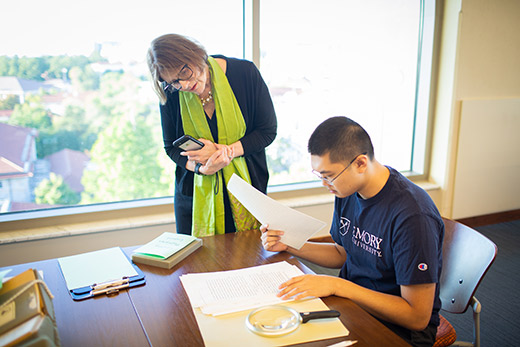
Student Jeffrey Gao and associate professor of history Judith Miller. From Emory Photo/Video.
Associate Professor Judith A. Miller is teaching a first-year seminar this spring titled “Fake News.” The Emory News Center’s Maureen McGavin describes the class as investigating “examples of fake news, conspiracy theories, hoaxes, biased stories and wrongful convictions, in the U.S. and in other countries, as well as discussions of how the falsehoods took hold and were eventually debunked.” Read the Emory News Center’s profile of the course, “‘Fake News’ class helps students learn to research and identify false information,” in addition to the full course description below.
“Fake news, hoaxes, “truthiness,” lies, spin rooms, bots, leaks, deniers, and propaganda: These phenomena have shaken the world in the recent years. Fake news has become important part of our daily political culture, whether in the United States or elsewhere around the globe. Elections and public policy have been influenced by them. Our course will delve into several historical cases of hoaxes, history “deniers,” and media exploitation before turning to the recent past and even daily events in the US and elsewhere. What dynamics do those examples reveal that can illuminate the contemporary world? Then we will explore the place of social media such as Twitter and Facebook, as well as darker parts of the web, in purveying both accurate and false information. For instance, how do “fake news” authors use language, music, and images to make their ideas more persuasive? How has technology increased the power of “fake news”? Why have certain kinds of societies been more or less vulnerable to propaganda? How have courts understood the principles of “free expression,” “burden of proof,” and a “free press”? How have politicians and journalists contributed to and struggled with the recent intensifying “fake news” phenomenon? We will work closely with Woodruff librarians as we evaluate evidence: How do historians weigh claims and sources? Are there even clear red flags in our media-saturated world? How can historical examples help us sort out these questions? Each student will develop a case study of an incident–understood broadly, anything from political propaganda anywhere in the world, to allegations of wrongful conviction or sexual assault, to history deniers, as just a few examples–that takes up these issues.”
Harvard UP Publishes Sharon T. Strocchia’s ‘Forgotten Healers’
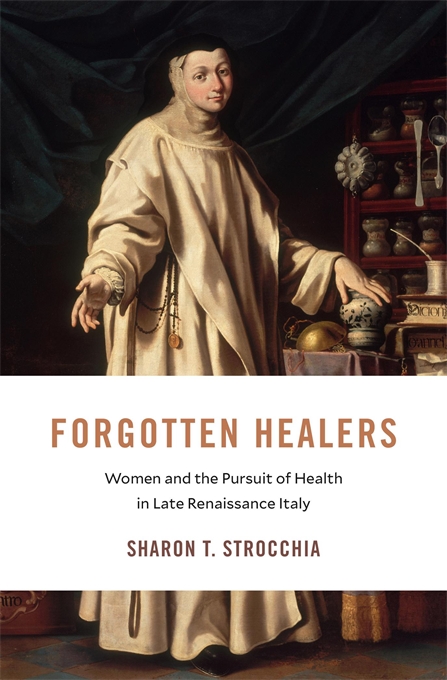
In December of 2019 Harvard University Press released Professor Sharon T. Strocchia‘s newest book, Forgotten Healers: Women and the Pursuit of Health in Late Renaissance Italy. The monograph recovers the pivotal roles that women played in providing health care in Renaissance Italy and, in doing so, uncovers their role in the transformation of early modern medicine and medical science. Sheila Barker, director at the Medici Archive Project, writes that Strocchia’s work “makes a vital contribution to the history of medicine, gender studies, and Renaissance studies.” Strocchia’s previous monographs were Death and Ritual in Renaissance Florence (Johns Hopkins UP, 1992) and Nuns and Nunneries in Renaissance Florence (Johns Hopkins UP, 2009), which was awarded the 2010 Marraro Prize by the American Catholic Historical Association. Read more about Forgotten Healers on the site for Harvard UP.
Emory News Center Features ‘Archival Lives’ Conference
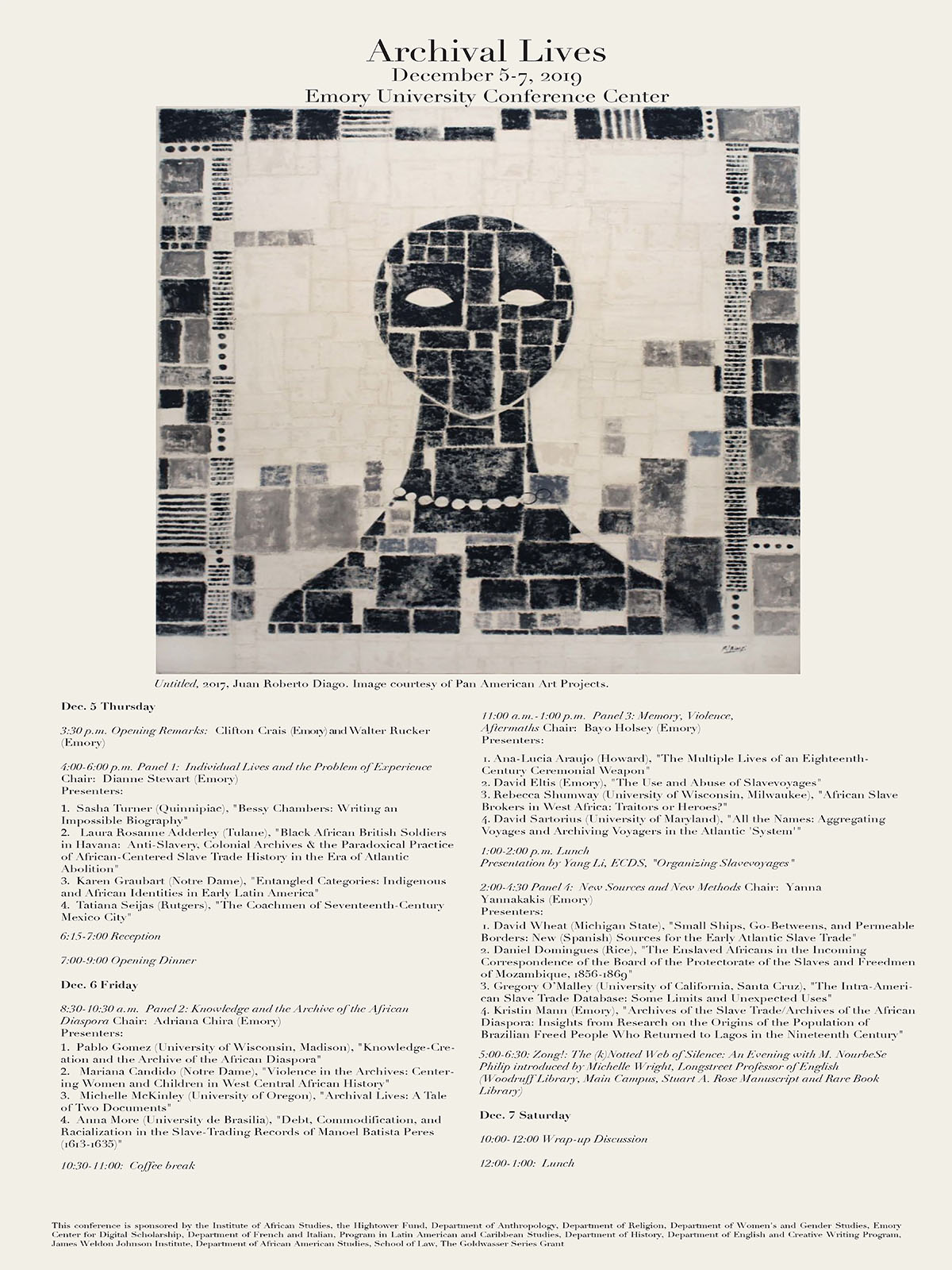
The Emory News Center featured a profile of the Archival Lives conference from December 5-7, 2019. Co-convened by Adriana Chira (History), Clifton Crais (African Studies/History), and Walter C. Rucker (African American Studies/History), the workshop brought together an array of participants “to reckon with what it means to work with and produce archives of the African diaspora.” Read April Hunt’s feature story on the Emory News Website, “‘Archival Lives’ conference examines trans-Atlantic slave trade,” in addition to the full description of the conference at “Archival Lives.”
Crespino Writes Op-Ed for ‘The New York Times’: “The Democrats Are in Georgia. The Stakes Couldn’t Be Higher.”
Dr. Joseph Crespino, Department Chair and Jimmy Carter Professor of History, authored an opinion piece in The New York Times last month on the day of the democratic presidential primary debate held here in Atlanta. In the article, “The Democrats Are in Georgia. The Stakes Couldn’t Be Higher,” Crespino provides historical context for democratic optimism that Georgia could turn blue in the 2020 election. Crespino’s most recent book is Atticus Finch: The Biography (Basic Books, 2018). Read an excerpt of The New York Times article below along with the full piece: “The Democrats Are in Georgia. The Stakes Couldn’t Be Higher.”
“In many ways, American politics today resemble an earlier era in Southern history, when candidates who only a few years before their election had been dismissed as jokes or nobodies stoked reactionary impulses to win the highest office in the state. That’s what happened in Georgia in 1966 when Lester Maddox, a folksy restaurateur and longtime failed candidate, was elected governor. After Congress passed the Civil Rights Act in 1964, forcing the desegregation of public accommodations in the South, Maddox leapt to public prominence by wielding an ax handle to chase away African-Americans who attempted to eat at his restaurant. He attracted the same voters that George Wallace won in neighboring Alabama — white Southerners embittered by social and political changes that they felt were being forced upon them by sanctimonious, out-of-touch elites.”
History Dept. Event Showcasing Eckert’s New Book Draws Crowd
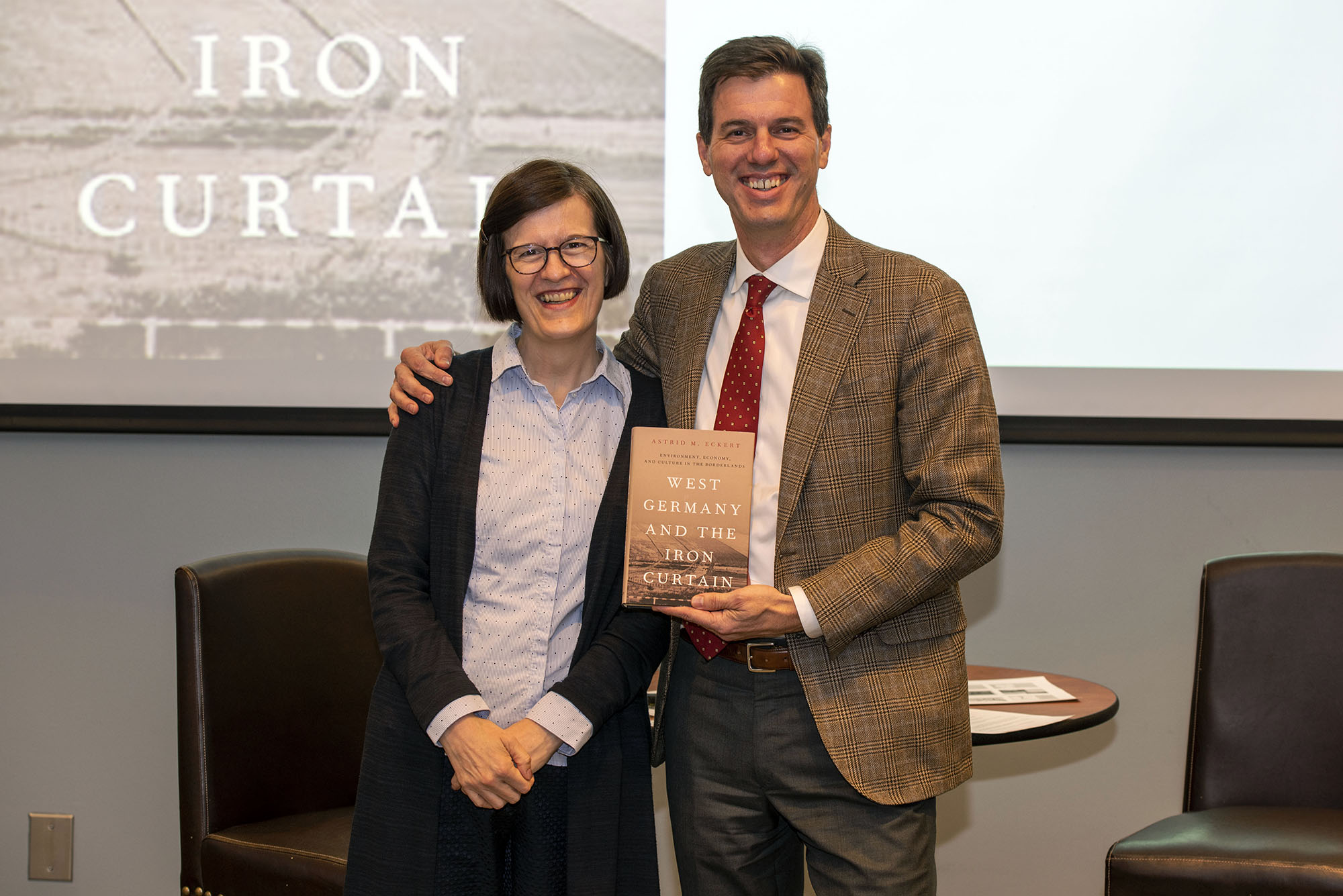
Dr. Astrid M. Eckert, Associate Professor of History, published West Germany and the Iron Curtain: Environment, Economy, and Culture in the Borderlands with Oxford University Press in October 2019. The History Department recently sponsored a public presentation and conversation about the new monograph with Eckert and Joseph Crespino, Department Chair and Jimmy Carter Professor of History. Over 75 guests attended the event, which is the first of three that the Department will host this year. To learn more about Eckert’s newest work, read the recent written Q&A we published: “New Books Series: Q & A with Astrid M. Eckert about ‘West Germany and the Iron Curtain.’”
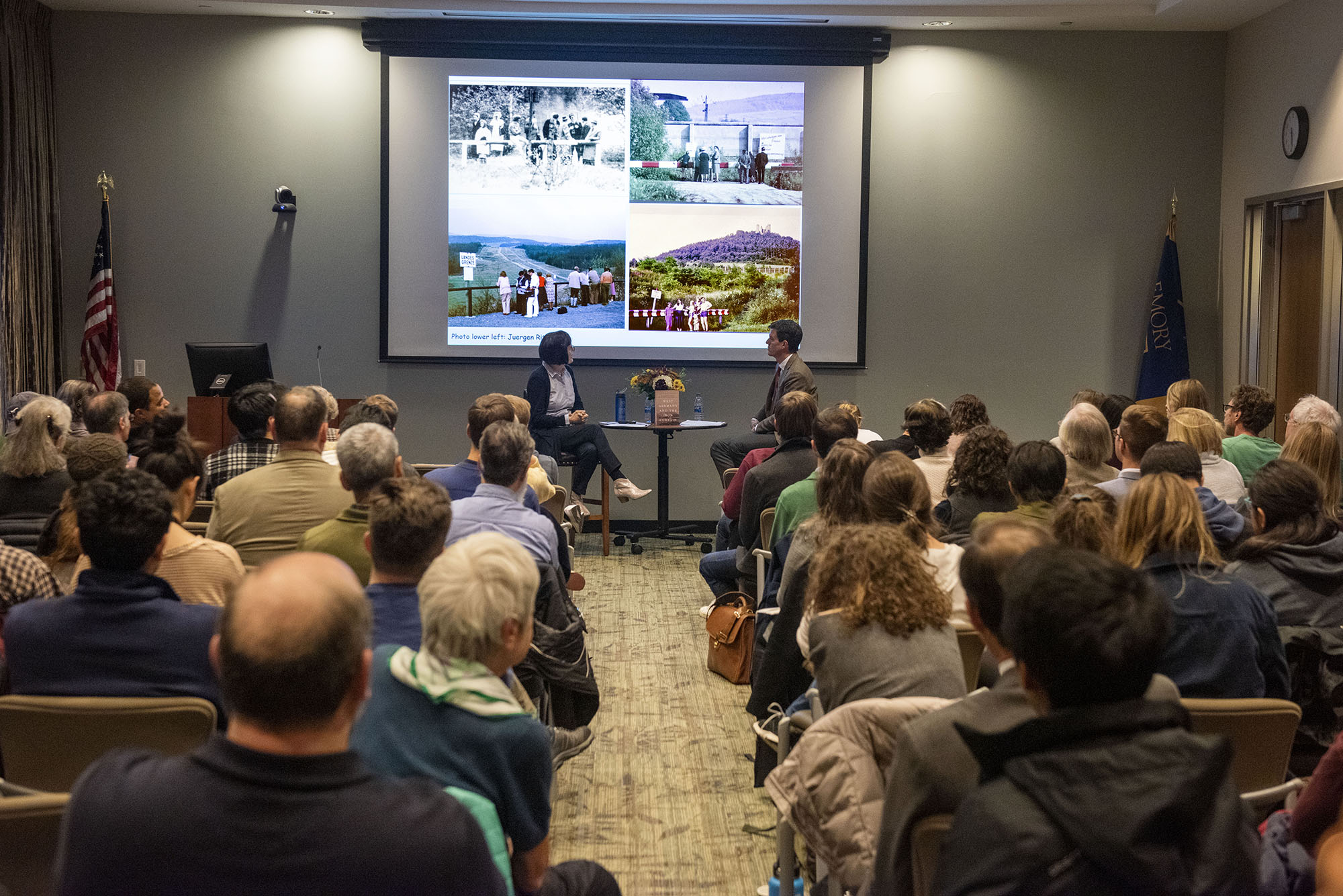
Emory News Center Features Eckert’s ‘West Germany and the Iron Curtain’ in Advance of Talk with Crespino
The Emory New Center recently published a feature about Dr. Astrid M. Eckert‘s new book, West Germany and the Iron Curtain: Environment, Economy, and Culture in the Borderlands (Oxford UP). The article presents some of Eckert’s central findings, which she will discuss in more depth with History Department Chair Joseph Crespino on Thursday, November 14. Find out more information about the event, hosted at 5pm in the Jones Room, 311 of the Robert W. Woodruff Library, here. Read the full Emory News Center article (written by April Hunt): “Iron Curtain’s consequences still evident for former West Germany.” Also learn more about the project by checking out our recent Q&A with Eckert: “New Books Series: Q & A with Astrid M. Eckert about ‘West Germany and the Iron Curtain’.”
Eltis Cited in ‘Nature’ Article on Tracing Origins of the Enslaved from St. Helena Island
David Eltis, Woodruff Professor Emeritus of History, was recently cited in a Nature article on research tracing the origins of the enslaved on St. Helena Island. Led by University of Copenhagen researchers Marcela Sandoval-Velasco and Hannes Schroeder, the study analyzed the DNA of 20 individuals from St. Helena and concluded that they were likely taken from West-Central Africa, or present-day Gabon and Angola. The piece quotes numerous scholars who see promise in genomic analysis for reconstructing the geographic origins of the enslaved.
Eltis co-founded Slave Voyages, the Emory-based digital memorial and database that collects nearly 36,000 transatlantic slaving voyages. This past summer Slave Voyages was re-launched in expanded and updated form. The Emory News Center featured the new edition here: “Documenting Slave Voyages: Led by Emory, a massive digital memorial shines new light on one of the most harrowing chapters of human history.”
Read the excerpt from the Nature piece that features Eltis below along with the full article: “Genomes trace origins of enslaved people who died on remote island.”
“David Eltis, a historian at Emory University in Atlanta, Georgia who co-founded a database that collects information on 36,000 slaving voyages between 1514 and 1866, notes that most people captured in the transatlantic slave trade originated from south of the equator — where a paucity of genome data from modern inhabitants makes it difficult to trace the origins of enslaved individuals with any accuracy.”